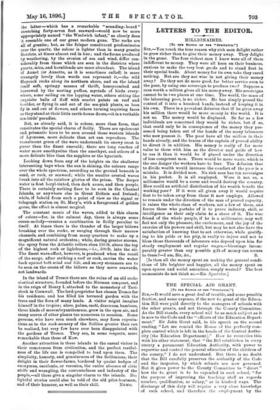LETTERS TO THE EDITOR.
MILLIONAIRES.
[To =a ammo or as msracrraros."d Silk—Yon touch the true reason why rich men delight rather to grow richer than to give their money away. They delight
in the game. The four richest men I knew were all of them indifferent to money. They were all keen on their business, anxious to make the very best goods and to stand first in
their special trade. About money for its own sake they oared nothing. But are they not wise in not giving their money away? Do they not do more good, far better service even to the poor, by using one sovereign to produce two P Suppose a man worth a million gives all his money away. His sovereigns cannot be in two places at one time. The world, the mass of the labouring poor, is no richer. Ho has simply passed the control of it into a hundred hands, instead of keeping it in his own. There is a prevalent delusion that if he gives away his million there would be more money in the world. It is not so. The money would be displaced. So far as a few individuals are concerned they would be richer, but if so, that could only be in consequence of the money they pos- sessed being taken out of the hands of the many labourers who now possess it. The poor have all the million in their hands already, and the brains of the captain of proved ability to direct it in addition. His money is really of far more value to them with him as the director and guide of how to use it than it would be if placed under the direction of less competent men. There would be more waste, which is the one danger the workers have to fear. The delusion that to divide wealth would increase the comfort of the poor is a mistake. It is divided now. No rich man has ten sovereigns in his pocket. It is all employed. Were it not so, a millionaire would be a curse and would destroy the country. How could an artificial distribution of his wealth benefit the working poor? If it were all given away it would require first to be taken away from those it now employs. Allowed to remain under the direction of the man of proved capacity, it raises the whole class of workers, not a few of them, and forces those who partake of it to prove industry, skill, or intelligence as their only claim to a share of it. The wise friend of the whole people, if he is a millionaire, may well feel not only the pleasure, the excitement, and the joy of the exercise of his powers and skill, but may he not also have the satisfaction of knowing that to act otherwise, while gratify- ing to his pride or his pity, is really to injure and not to bless those thousands of labourers who depend upon him for steady employment and regular wages,—blessings incom- parably greater than any possible gift of money can secure
[Is then all the money spent on making the general condi- tions of life brighter and happier, all the money spent on open spaces and social amenities, simply wasted? The best economists do not think so.—En. Spectator.]






































 Previous page
Previous page